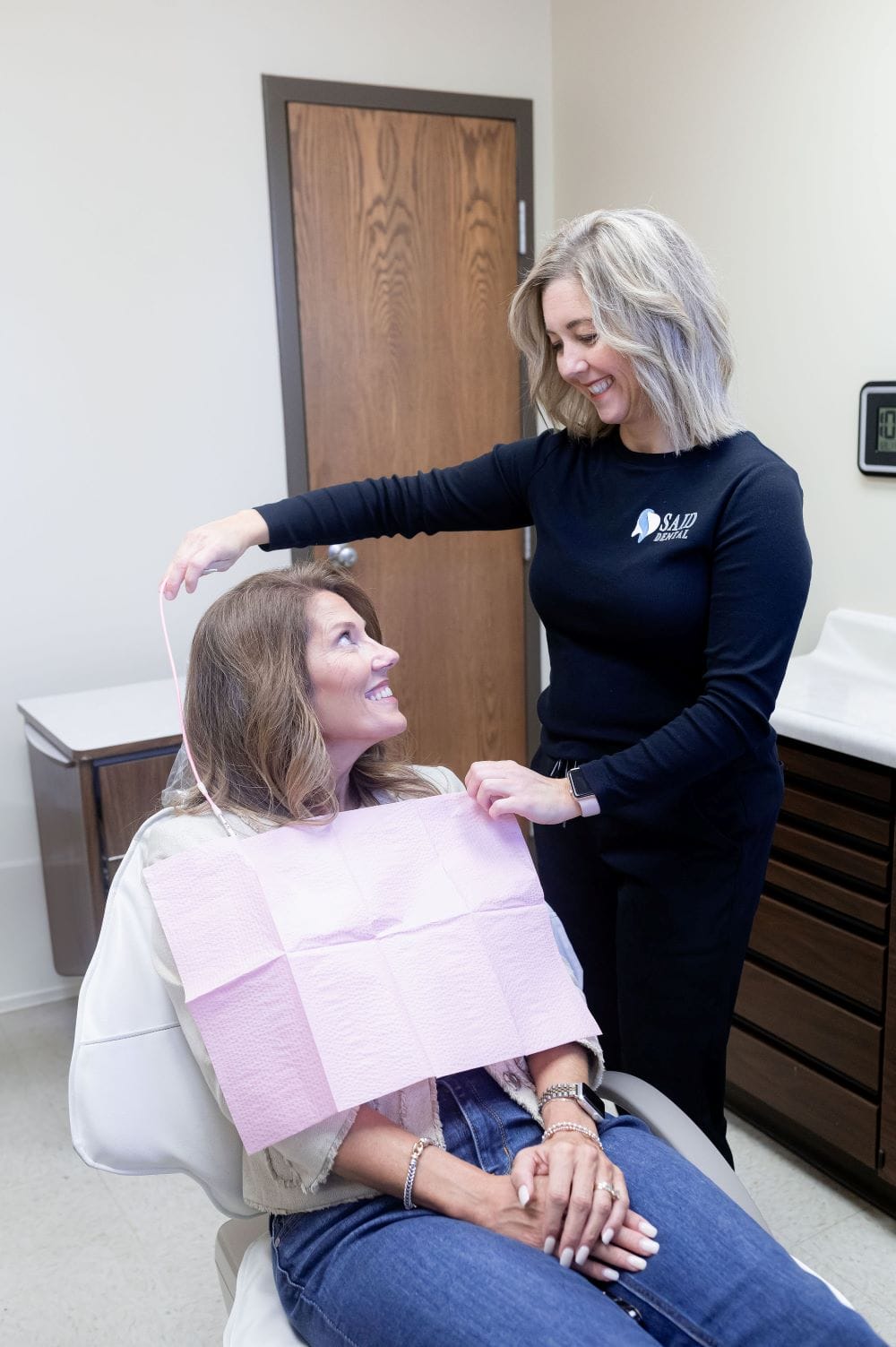
Where Innovation and Compassion Intersect
At Said Dental, we’re more than just a dental office—we’re your partner in achieving and maintaining a healthy, beautiful smile. Dr. Bassem Said and our skilled team are dedicated to providing a full range of dental services, from routine cleanings to advanced treatments and procedures, all delivered with a personal touch. We believe in building lasting relationships with our patients, taking the time to listen to your concerns and understand your needs. Our Canton, OH office is designed to be a welcoming space where you can feel at ease, knowing that you’re receiving the highest standard of care. At Said Dental, we’re not just improving smiles—we’re enhancing lives, one patient at a time.
our Trusted Expert for TMJ Treatment in Canton, OH
At Said Dental, we understand the importance of a complete, confident smile. Our custom dentures are designed to restore both the function and appearance of your teeth, allowing you to eat, speak, and smile with ease. Whether you need full dentures, partial dentures, or implant-supported options, our team is dedicated to providing a solution that fits your lifestyle and preferences. Using advanced materials and techniques, we create dentures that are comfortable, durable, and natural-looking. We take the time to understand your unique needs, ensuring a personalized approach to your care.
Relieve TMJ Pain with Expert Treatment in Canton OH
The temporomandibular joint (TMJ) is the joint that connects the jawbone to the skull (temporal bone), allowing for the movement of the jaw. Temporomandibular joint disorder, also known as TMD, is a condition that affects the temporomandibular joints and the surrounding muscles. TMJ disorder can be caused by various factors, such as stress, injury, arthritis, or misaligned teeth. These factors can lead to inflammation, muscle spasms, and damage to the joint, resulting in pain and discomfort.
Common TMJ or TMD symptoms include:
- Jaw pain
- Tenderness or soreness around the jaw joint
- Clicking or popping sounds when opening or closing the mouth
- Headaches
- Difficulty opening or closing the mouth
- Locking of the jaw
- Change in the way the teeth fit together
- Earaches
- Neck pain
- Toothaches

Where Innovation and Compassion Intersect
At Said Dental, we’re more than just a dental office—we’re your partner in achieving and maintaining a healthy, beautiful smile. Dr. Bassem Said and our skilled team are dedicated to providing a full range of dental services, from routine cleanings to advanced treatments and procedures, all delivered with a personal touch. We believe in building lasting relationships with our patients, taking the time to listen to your concerns and understand your needs. Our Canton, OH office is designed to be a welcoming space where you can feel at ease, knowing that you’re receiving the highest standard of care. At Said Dental, we’re not just improving smiles—we’re enhancing lives, one patient at a time.

Where Innovation and Compassion Intersect
At Said Dental, we’re more than just a dental office—we’re your partner in achieving and maintaining a healthy, beautiful smile. Dr. Bassem Said and our skilled team are dedicated to providing a full range of dental services, from routine cleanings to advanced treatments and procedures, all delivered with a personal touch. We believe in building lasting relationships with our patients, taking the time to listen to your concerns and understand your needs. Our Canton, OH office is designed to be a welcoming space where you can feel at ease, knowing that you’re receiving the highest standard of care. At Said Dental, we’re not just improving smiles—we’re enhancing lives, one patient at a time.
Understanding Bruxism: Causes, Symptoms, and Long-term Effects
Bruxism is a condition characterized by teeth clenching and grinding, often during sleep. This condition can be caused by various factors, such as stress, anxiety, misaligned teeth, or sleep disorders.
Common symptoms of bruxism include:
- Worn or damaged teeth
- Frequent headaches
- Pain in jaw joints
- Earaches
- Facial pain, especially in the jaw, neck, and shoulders
If left untreated, bruxism can also lead to long-term effects such as tooth sensitivity, gum recession, and even tooth loss in severe cases. Additionally, bruxism can negatively affect one’s quality of life, leading to poor sleep, fatigue, and stress.
How One Condition Can Worsen the Other
TMJ disorder and bruxism are closely related conditions that can often occur together. Bruxism, or teeth grinding, can put extra strain on the temporomandibular joint (TMJ) and surrounding facial muscles, leading to TMJ disorder or exacerbating existing TMJ symptoms.
Here are some additional details on the connection between bruxism and TMJ disorder:
1. Bruxism to TMJ Disorder
When you grind your teeth, you put extra pressure on your jaw and surrounding muscles, which can lead to inflammation and pain. Over time, this pressure can cause damage to the temporomandibular joint, exacerbating TMJ disorder symptoms such as jaw pain, headaches, and earaches. Additionally, the muscle tension associated with bruxism can make it difficult for the jaw to function properly, further worsening TMJ disorder symptoms.
2. TMJ Disorder to Bruxism
The discomfort and pain associated with TMJ disorder can cause the body to compensate by clenching or grinding the teeth, leading to bruxism symptoms. Additionally, the muscle tension and pain associated with TMJ disorder can make it difficult to relax the jaw muscles, further exacerbating bruxism symptoms.
Note: The relationship between bruxism and TMJ disorder is complex and can vary from person to person. If you’re experiencing symptoms of either condition, it’s important to seek professional treatment to accurately diagnose and effectively treat the underlying causes of your symptoms.
How Can Said Dental Help with TMJ and Bruxism?
At Said Dental, we understand the impact that TMJ disorder and bruxism can have on your quality of life. That’s why we offer a range of treatment options for TMJ disorder and bruxism, including:
- Oral appliances: We can provide customized oral appliances, such as mouthguards, to protect your teeth from further damage and alleviate muscle tension.
- Physical therapy: Physical therapy addresses the muscle tension and pain associated with TMJ disorder or bruxism.
- Medication: Certain medications alleviate pain and reduce inflammation caused by TMJ disorder or bruxism.
- Providing maximum protection: A custom mouthguard can protect your teeth from further damage caused by bruxism.
- Alleviating symptoms: By reducing the amount of pressure placed on your teeth and jaw, a custom mouthguard can help alleviate the symptoms of bruxism, such as jaw pain and headaches.
- Promoting better sleep: Bruxism can interfere with your sleep quality, but a custom mouthguard can help improve your sleep by reducing muscle tension and promoting relaxation.
- Improving overall dental health: By preventing further damage to your teeth, a custom mouthguard can help improve your overall dental health and prevent more serious issues down the line.

